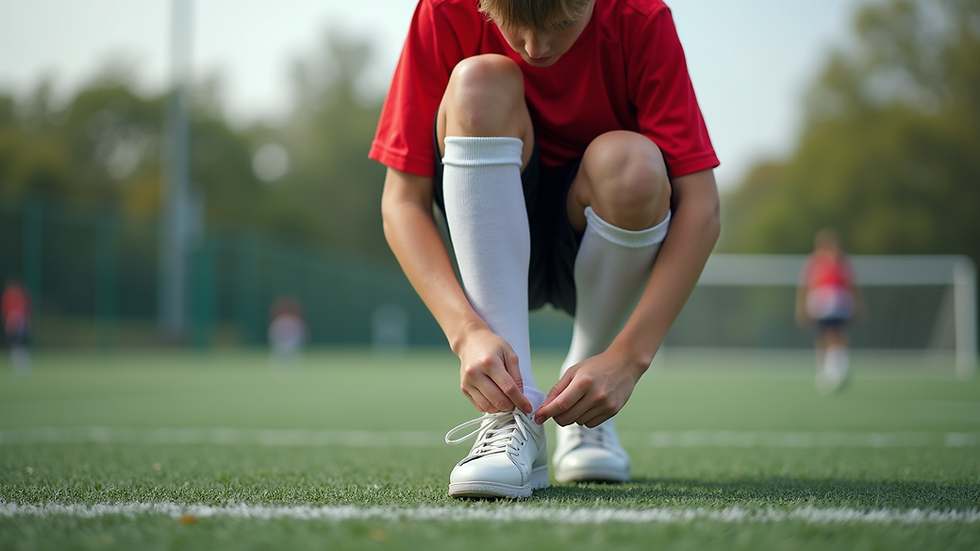The Power of Resilience in Sports
- Tessa McIlraith
- Sep 15, 2025
- 4 min read
Every young athlete faces challenges on their journey. From tough losses to injuries and self-doubt, the path is rarely smooth. What separates those who thrive from those who give up? The answer lies in athlete mental resilience. This powerful trait helps young sports stars bounce back stronger, stay motivated, and keep pushing toward their goals.
In this post, we will explore what mental resilience means for athletes, why it matters, and how parents can nurture it in their children. Plus, I’ll share insights from my new book Beyond the Sidelines that will help you support your young athlete’s growth both on and off the field.

Understanding Athlete Mental Resilience
Mental resilience is the ability to recover quickly from setbacks, adapt to change, and keep going despite difficulties. In sports, this means handling losses, injuries, and pressure without losing confidence or motivation.
For young athletes, resilience is crucial because sports are full of ups and downs. A missed goal, a tough coach, or a bad game can feel devastating. But resilient athletes learn to see these moments as opportunities to grow rather than reasons to quit.
Parents play a key role in building this resilience. Encouraging a growth mindset, praising effort over results, and teaching coping skills can make a huge difference. When kids know that mistakes are part of learning, they develop the confidence to try again.
Here are some practical ways to foster athlete mental resilience:
Celebrate effort and progress, not just wins.
Model positive self-talk and stress management.
Encourage goal-setting that focuses on personal improvement.
Teach relaxation techniques like deep breathing or visualization.
Create a supportive environment where failure is seen as a step forward.
By nurturing these habits, parents help their children develop the mental toughness needed to thrive in sports and life.

Why Athlete Mental Resilience Matters More Than Ever
In today’s competitive sports world, physical skills alone are not enough. The mental game often decides who succeeds. Athletes with strong mental resilience can:
Bounce back quickly from losses or injuries.
Stay focused under pressure.
Maintain motivation during long training periods.
Handle criticism constructively.
Balance sports with school and social life.
Without resilience, young athletes may experience burnout, anxiety, or loss of interest. This can lead to quitting sports altogether, which is heartbreaking for both parents and kids.
Building mental resilience also prepares athletes for life beyond sports. The skills they develop - perseverance, adaptability, and emotional control - are valuable in school, relationships, and future careers.
If you want to learn more about how to support your child’s mental resilience, check out this resource on resilience in athletes. It offers expert guidance tailored to young athletes and their families.
What are the 7 C's of Resilience?
Understanding the 7 C's of resilience can help parents and coaches create a strong foundation for young athletes. These seven qualities work together to build mental toughness and emotional strength:
Competence - Feeling capable and skilled in sports and life.
Confidence - Believing in one’s abilities and decisions.
Connection - Having supportive relationships with family, coaches, and peers.
Character - Developing a sense of right and wrong, integrity, and responsibility.
Contribution - Feeling valued by giving back to the team or community.
Coping - Managing stress and emotions effectively.
Control - Believing you can influence outcomes through effort.
By focusing on these areas, parents can help their young athletes build a resilient mindset that lasts a lifetime.
How to Apply the 7 C's
Competence: Encourage skill development through practice and positive feedback.
Confidence: Celebrate small wins and reinforce self-belief.
Connection: Foster strong bonds with teammates and mentors.
Character: Teach sportsmanship and ethical behavior.
Contribution: Involve your child in team roles or community service.
Coping: Introduce stress-relief activities like mindfulness or journaling.
Control: Help your child set realistic goals and take ownership of their progress.
These steps create a balanced approach to resilience that supports both mental and emotional growth.

Practical Tips for Parents to Boost Resilience in Young Athletes
Supporting your child’s mental resilience doesn’t require special training. Simple, consistent actions can make a big impact. Here are some tips to get started:
Listen actively: Let your child share their feelings without judgment.
Encourage problem-solving: Help them think through challenges and find solutions.
Promote a balanced lifestyle: Ensure time for rest, school, and fun outside sports.
Set realistic expectations: Focus on effort and improvement, not just trophies.
Be a role model: Show resilience in your own life by handling setbacks positively.
Celebrate progress: Recognize hard work and personal growth regularly.
Teach emotional regulation: Help your child identify and manage emotions like frustration or anxiety.
Remember, resilience is a skill developed over time. Your support and patience are key ingredients in this journey.
Beyond the Sidelines - A Guide for Parents
If you want to dive deeper into helping your young athlete develop mental resilience, my new book Beyond the Sidelines is designed just for you. It offers:
Real-life stories from athletes and parents.
Practical exercises to build resilience skills.
Tips for managing stress and pressure.
Strategies to foster a positive sports environment at home.
Beyond the Sidelines is more than a book - it’s a toolkit for parents who want to empower their children to succeed in sports and life. By understanding the mental side of athletics, you can help your child enjoy the game, overcome obstacles, and grow into a confident, resilient individual.
Building athlete mental resilience is a journey filled with challenges and rewards. With the right support, young athletes can learn to face adversity head-on and come out stronger every time. Your role as a parent is vital in this process. Together, we can help the next generation of athletes not just play the game, but thrive beyond the sidelines.
Ready to take the next step? Discover more about fostering resilience in your young athlete by visiting resilience in athletes. Your child’s mental strength is the greatest gift you can give them on their sports journey.
%20(Landscape)).png)



Comments